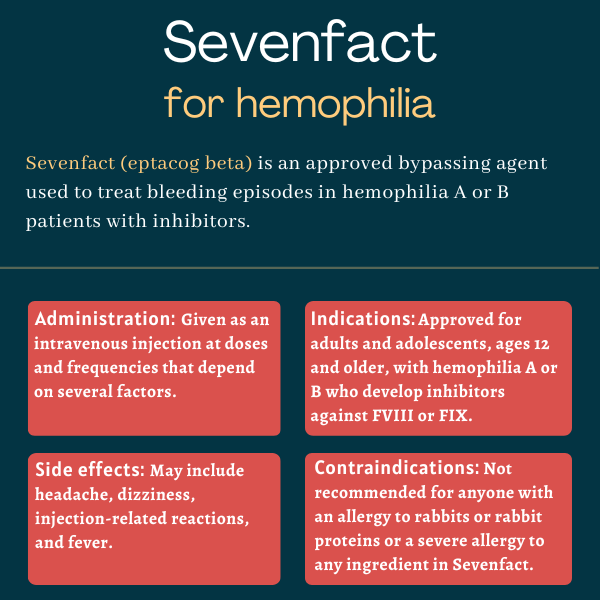Sevenfact (eptacog beta) for hemophilia
What is Sevenfact for hemophilia?
Sevenfact (eptacog beta) is a bypassing agent that’s approved to treat bleeding episodes in people with hemophilia A or hemophilia B who developed inhibitors, or neutralizing antibodies, against clotting factor VIII (FVIII) or factor IX (FIX). It’s indicated for adults and adolescents, ages 12 and older.
The therapy was developed by the Laboratoire Francais du Fractionnement et des Biotechnologies (LFB) and is marketed in the U.S. and Canada by Hema Biologics. It is given as an intravenous or into-the-vein infusion.
Therapy snapshot
| Brand name: | Sevenfact |
| Chemical name: | Eptacog beta |
| Usage: | Treatment and control of bleeding episodes in hemophilia A or B patients |
| Administration: | Intravenous infusion |
How does Sevenfact work?
Hemophilia occurs when blood fails to clot properly because a clotting protein is faulty or missing. In hemophilia A, the faulty or missing clotting factor is FVIII; in hemophilia B, it is FIX.
As a result of hemophilia, patients may experience heavy and/or prolonged bleeding episodes, occurring either spontaneously or following an injury or surgery.
Sevenfact contains a protein called eptacog beta, a recombinant or lab-made version of the clotting factor VIIa (FVIIa) that’s similar to and works in the same way as the FVIIa that is needed for blood to clot normally. FVIIa activates another clotting protein, called factor X, or FX, which then kickstarts a series of events needed to form a blood clot.
By activating FX, Sevenfact can promote blood clotting while bypassing the need for FVIII or FIX. This is expected to help control bleeding episodes in people with hemophilia A or B who have developed inhibitors against FVIII or FIX. Such inhibitors may render conventional replacement therapies ineffective.
Eptacog beta is made using genetically engineered rabbits. These animals harbor a gene that provides instructions for making human FVII in cells of the mammary gland. The clotting protein is secreted into milk and then converted into its activated FVIIa form through LFB’s rPro technology.
Who can take Sevenfact?
Sevenfact was approved by the U.S. Food and Drug Administration (FDA) in April 2020 to prevent and control bleeding episodes in adults and adolescents, ages 12 and older, with hemophilia A or B and FVIII or FIX inhibitors. The decision marked the first approval of a new bypassing agent in the U.S. in more than 20 years.
The medication then was approved in the European Union in 2022, where it is sold under the brand name Cevenfacta. In Europe, the medication also is approved to prevent bleeds occurring during surgery or invasive procedures in certain groups of patients.
Who should not take Sevenfact?
Sevenfact is contraindicated, or not recommended, for anyone with:
- a known allergy to rabbits or rabbit proteins
- a history of a severe allergic reaction to Sevenfact or any of its ingredients.
A boxed warning is shown on Sevenfact’s prescribing information that notes that the therapy may cause serious thrombotic or blood clot-related events. For this reason, patients on Sevenfact should be closely monitored for signs of a thrombotic event. If such an event occurs, Sevenfact’s dose should be reduced or treatment should be discontinued altogether.
The therapy also is not indicated for use in congenital FVII deficiency, a blood clotting disease present from birth that arises due to low or no FVII in the body.
How is Sevenfact administered?
Sevenfact is given as an infusion directly into the bloodstream, and may be self-administered after appropriate training by a healthcare provider. Each infusion should take no longer than two minutes.
The concentrate is available as a white to off-white powder supplied in color-coded single-use vials containing 1 mg (yellow), 2 mg (green), or 5 mg (purple) of recombinant FVIIa. The powder must be diluted, or reconstituted, using prefilled syringes containing 1.1, 2.2, or 5.2 mL of sterile water.
When mixed together, powder and diluent create a clear to slightly opaque solution that should be infused within four hours of reconstitution. After reconstitution, each milliliter of solution should contain 1 mg — or 1,000 micrograms (mcg) — of FVIIa.
The dose and duration of treatment depend on several factors, including the location and severity of the bleed, the need for urgent treatment, and the patient’s clinical response.
For mild or moderate bleeding episodes, such as superficial muscle bleeds, patients are recommended to take Sevenfact at one of two doses:
- A dose of 75 micrograms per kilogram (mcg/kg) of body weight is given as a first dose, and can be repeated every three hours until bleeding is controlled.
- An initial dose of 225 mcg/kg is administered; if bleeding is not controlled within nine hours, patients are recommended to receive additional 75 mcg/kg doses every three hours as needed until bleeding is controlled.
For patients taking the initial 225 mc/kg dose, alternative treatments should be considered in the event that bleeds fail to be controlled within 24 hours of the first dose of Sevenfact.
In cases of severe bleeding episodes, such as life-threatening bleeds or those occurring in the brain or gastrointestinal tract, patients are recommended to take Sevenfact at an initial dose of 225 mcg/kg, followed by an additional dose of 75 mcg/kg six hours later, if needed. Additional 75 mcg/kg doses may be given every two hours until bleeding is controlled.
Infusions can be done at a clinic or at home, but patients should not attempt to self-administer Sevenfact unless they have received proper training from a doctor or other healthcare professional.

Sevenfact in clinical trials
Sevenfact’s approvals were mainly supported by data from a Phase 3 clinical trial dubbed PERSEPT 1 (NCT02020369). It compared the safety and efficacy of two different doses of the therapy in people with hemophilia A or B who had developed inhibitors.
PERSEPT 1 trial
The study included 27 people, ages 12 to 54, who received on-demand treatment with Sevenfact at a starting dose of either 75 or 225 mcg/kg. Both groups could then receive subsequent 75 mcg/kg doses at prespecified timepoints, as needed.
Among a total of 468 bleeding episodes, 465 were mild to moderate in severity.
The results showed that the higher dose was better than the 75 mcg/kg dose at controlling bleeding, with a greater proportion (91% vs. 82%) of mild to moderate bleeding episodes controlled within 12 hours after infusion.
There were three severe bleeding episodes during the study, all controlled with the higher dose protocol.
Both doses were well tolerated, and none of the patients developed inhibitors against FVIIa, nor experienced allergic reactions or serious abnormal blood clotting events.
PERSEPT 2 trial
PERSEPT 2 (NCT02448680), another Phase 3 clinical trial, compared the safety and efficacy of two different doses of Sevenfact in 25 boys, ages 1 to 11, with hemophilia A or B with inhibitors.
A dozen boys were randomly assigned to receive on-demand treatment with Sevenfact at an initial dose of 75 mcg/kg, while 13 were given an initial higher dose of 225 mcg/kg.
As in the previous trial, both groups were continuously monitored for bleeding control, and could receive additional 75 mcg/kg infusions at certain timepoints, if needed. Three months after the trial’s start, the two groups switched doses.
The trial was open-label, meaning both participants and researchers knew which patient was given which medication.
These results showed that both low and high doses worked well in controlling most mild or moderate bleeding episodes within 12 hours (65.4% vs. 60.3%) and 24 hours (97.4% vs. 98%).
As in the PERSEPT 1 study, both doses were well tolerated, and none of the patients developed neutralizing antibodies against FVIIa, experienced allergic reactions, or had serious abnormal blood clotting events.
PERSEPT 3 trial
A further Phase 3 clinical trial, called PERSEPT 3 (NCT02548143), evaluated the safety and efficacy of Sevenfact in preventing and controlling excessive bleeding in people with hemophilia A or B with inhibitors who had been scheduled to undergo a surgical procedure.
A total of 12 boys and men, ages 2 to 56, with severe hemophilia A, were involved in the study. Six underwent minor surgery, and the other six a major surgical procedure.
Before surgery, the patients received a single dose of 75 mcg/kg, for minor surgeries, or 200 mcg/kg, for major surgeries. Then, all received Sevenfact during and after their surgical procedure at a dose of 75 mcg/kg for 2-5 days depending on the surgery type.
The results showed that bleeding control was rated as “good” or “excellent” in 81.8% of the cases two days after the surgical procedure. This meant that blood loss was as expected or less than expected (excellent), or no more than 50% greater than expected (good) for the type of procedure the patients had undergone.
The therapy also was found to be better at controlling bleeding in minor versus major surgical procedures (100% vs. 66.7%).
Common side effects of Sevenfact
The most common side effects that have been reported in clinical trials of Sevenfact include:
- headache
- dizziness
- injection-related reactions, including discomfort and hematoma (a serious bruise) at the site of injection
- fever.
Blood clotting
Sevenfact’s label carries a boxed warning noting that serious thrombotic events, or blood clotting issues, may occur in patients given the therapy. This includes stroke, blockage of the blood vessels that carry blood to the lungs, and blockage of deep veins in the body.
These events were not observed in clinical studies of Sevenfact, but have been reported in trials and with real-world use of products similar to the medication.
Patients may be at an increased risk of experiencing such events if they have a history of certain conditions, such as:
- congenital or acquired hemophilia, and are receiving treatment with prothrombin complex concentrates (e.g. FEIBA) or other hemostatic agents to stop bleeding
- vascular diseases, including atherosclerosis, septicemia, and cerebrovascular disease.
Symptoms of a thrombotic event in places other than the site of bleeding can include swelling and pain in the limbs, chest pain, shortness of breath, loss of sensation or motor power, and altered consciousness or speech. If symptoms develop, treatment with Sevenfact should be stopped or its dose should be lowered, depending on the patient’s condition. Medical attention also may be required.
Allergic reactions
Allergic or hypersensitivity reactions, including anaphylaxis — a severe, whole-body allergic reaction to a medication — to Sevenfact may occur. If symptoms develop, treatment with Sevenfact should be stopped, and immediate medical attention should be sought.
Symptoms of an allergic reaction may include hives, itching, rash, difficulty breathing, swelling around the mouth and throat, tightness of the chest, wheezing, dizziness or fainting, and low blood pressure.
People with a known allergy to casein, a protein found in milk, may be at higher risk of experiencing a hypersensitivity reaction.
Development of inhibitors
Although it was never observed in clinical studies, patients treated with Sevenfact may develop inhibitors against FVIIa. If this happens, it may stop Sevenfact from working properly. If bleeding does not stop with an appropriate dose, a blood test may be done to check for the presence of inhibitors.
Use in pregnancy and breastfeeding
It is not known if Sevenfact is safe to use during pregnancy or breastfeeding, or whether it can be harmful to a developing fetus or for the breastfed infant. It’s also unknown if the therapy can impact milk production or pass to breast milk.
Women who are pregnant or breastfeeding, or planning to become pregnant or breastfeed, should consult their doctor before taking Sevenfact.
Hemophilia News Today is strictly a news and information website about the disease. It does not provide medical advice, diagnosis or treatment. This content is not intended to be a substitute for professional medical advice, diagnosis, or treatment. Always seek the advice of your physician or other qualified health provider with any questions you may have regarding a medical condition. Never disregard professional medical advice or delay in seeking it because of something you have read on this website.
Recent Posts
- Going back to basics and finding strength on the floor
- Hympavzi lowers bleeding rates for hemophilia patients with inhibitors
- How our oldest son and hemophilia entered our lives, part 2
- Tips for supporting and validating loved ones with hemophilia
- Building and nurturing resilience in children with hemophilia
Related articles

 Fact-checked by
Fact-checked by 


